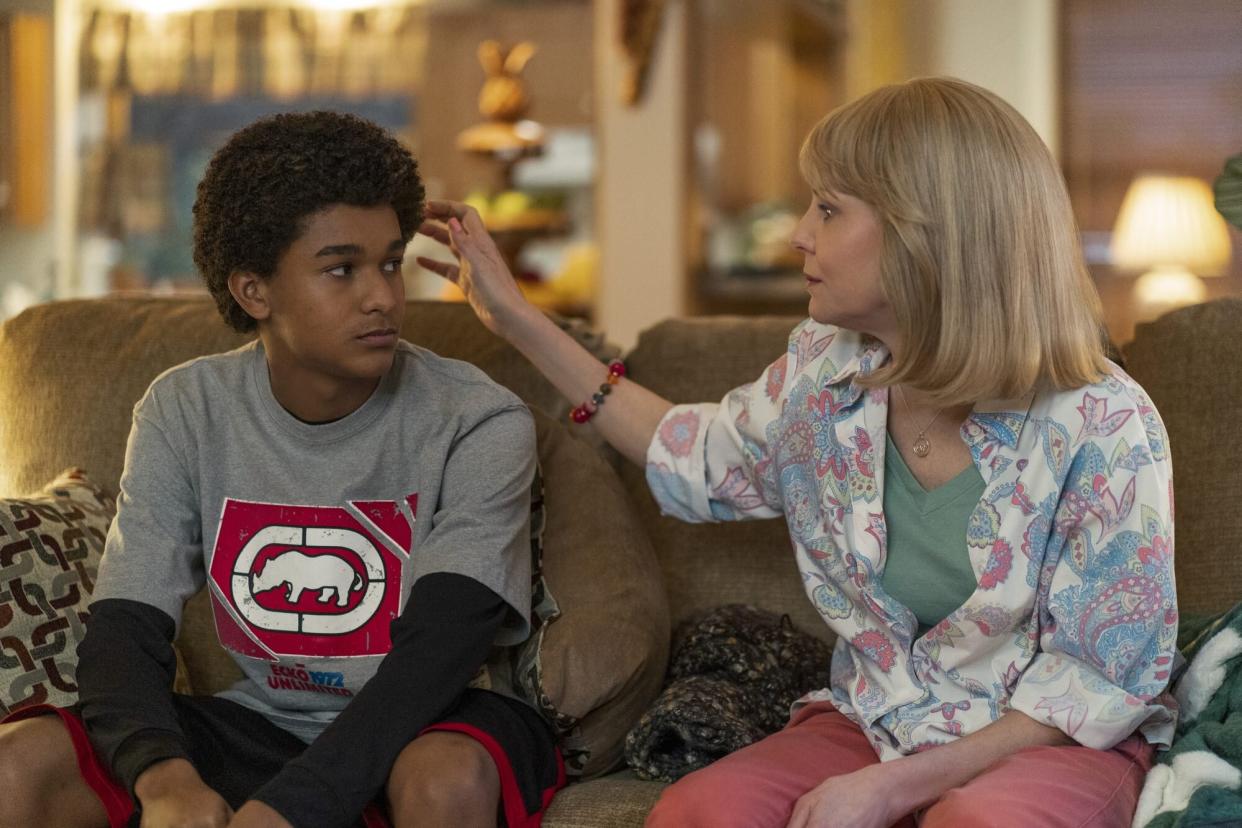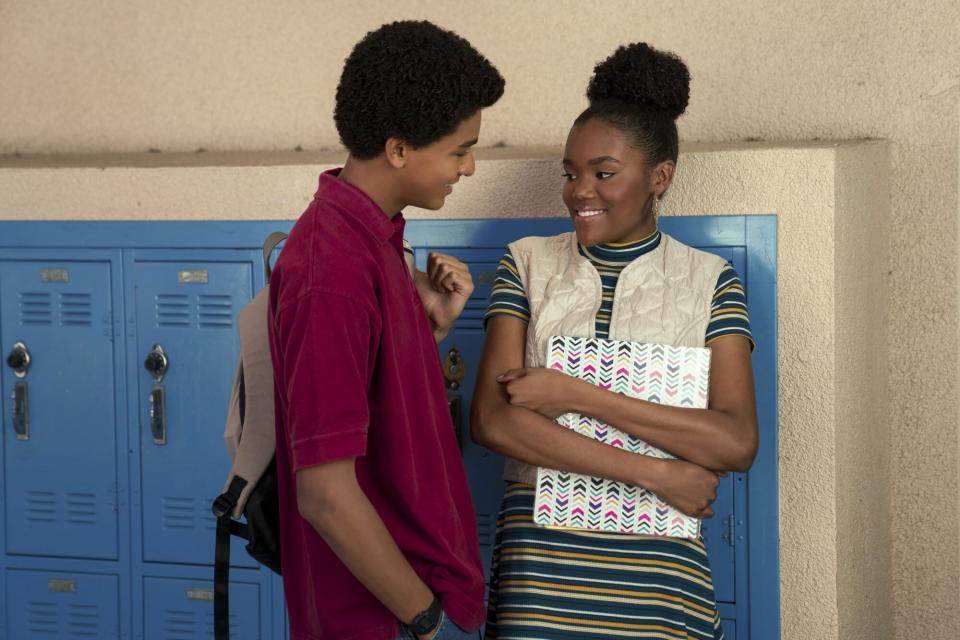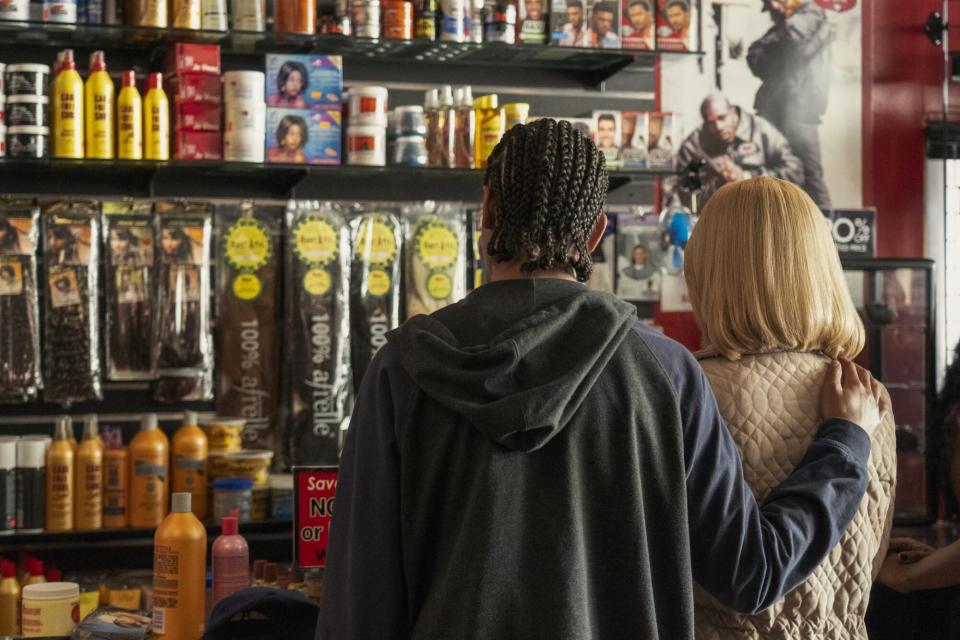Colin Kaepernick's Netflix Series, 'Colin in Black & White,' Sheds Light on Transracial Adoption

- Oops!Something went wrong.Please try again later.
Ser Baffo/Netflix
Adoption is a beautiful gift to humanity. Netflix's Colin in Black and White candidly shines a light specifically on transracial adoption, or when parents of one ethnic group adopt children of another nationality or ethnicity. Under the direction of Ava Duvernay (When They See Us, Selma, 13th), social activist, former professional athlete, and adoptee Colin Kaepernick narrates this six-part series about his early life. Episodes take a deep dive into the microaggressions and macroaggressions that many Black boys and Black girls experience while navigating predominantly white spaces.
Colin in Black and White is educational and paints a coming-of-age story about the life of young Colin Kaepernick, played by Jaden Michael in his teenage years. The storylines provide a rich, historical context that teenage and adult viewers can both immediately identify with. Featuring themes of systemic racism, racial bias, unconscious bias, discrimination in sports, and preconceptions about Black beauty, the series recounts Kaepernick's high school years and his experiences with race and racism, which guided his activism. The constant in the series is the missing cultural link that often occurs when Black adoptees like Kaepernick begin to step into their own authentic identities while co-existing with their non-Black parents.
RELATED: I Couldn't Be More Proud of My Son's Love for His Black Skin
From the beginning of the series, it's evident that Kaepernick's parents, Theresa Kaepernick (Mary Louise-Parker) and Rick Kaepernick (Nick Offerman) truly loved and supported him. It's also clear that they did not discuss race with him often and were not familiar with Black culture. Black children disproportionately feel the stress and pressure of discrimination when they do not have parents that they can identify with culturally. It's crucial for parents who choose to adopt children of different ethnicities and cultures to be intentional about learning the history and culture of their children. Transracial adoption coach Chad Goller-Sojourner said in an NPR interview of his upbringing by white parents: "One of the things that I think was hardest for me is I didn't have any independent relationships with Black people, especially adult Black people, 'til I was an adult. I was 25 before I saw a Black doctor." Goller-Sojourner's experience stresses the importance and the need for parents to recognize that their adopted children may have needs that they alone can't address. In the series, Kaepernick's parents' lack of communication about race and culture leads to a lack of agency for a young Kaepernick in many areas of his life.
In an episode entitled "Crystal," his mother becomes flustered and worried when she finds out that Colin is interested in taking a Black girl to his high school dance instead of a white girl. After the school dance photos arrive, the photo of Colin and his beautiful, dark-skinned, Black date is hidden in a kitchen drawer. In contrast, the pictures of her biological kids' dates are all neatly displayed on the living room mantle. She was shocked at his attraction to Black girls and even mentioned to her husband that it was "a phase."

Ser Baffo/Netflix
Deb Reisner, an adoptive mom and member of North American Council of Adoptive Children (NACAC), says that loving your adoptive child is not enough. "Because my husband and I do not share our children's racial or cultural backgrounds, we must work extra hard to help them develop skills and strategies to deal with the everyday reality of racism," she says. "To live authentically in our racist society, each of our children must learn to externalize racism—to understand that racism is not about him or her but a reflection of other people's ignorance. Externalizing racism is not about dismissing racism or pretending it does not exist."
Cultural awareness helps parents avoid being unaware and inconsiderate of the experiences of their Black children. However, extensive research at Stanford University reveals that white parents do not discuss race and racism with their children in-depth because the need does not seem as urgent for them.
"The colorblind approach has consequences that can actually impede our move toward equality," says Jennifer Eberhardt, professor in public policy at Stanford University. "When people focus on not seeing color, they may also fail to see discrimination—in their own neighborhoods, at their own schools, in their daily lives." For example, when a cop pulls over Kaepernick as a teen in one episode, the officer is highly paranoid and aggressive with him. When the ordeal is over, his mom innocuously jokes that he "dodged a bullet." This was one of the most insensitive things that anyone could ever say to a young, Black man in that situation.
The series depicts Colin's parents as oblivious to the implicit racial bias their son experienced regularly. While both parents are very loving, the missing cultural link is apparent. Rachel Garlinghouse, author of Come Rain or Shine: A White Parent's Guide To Adopting and Parenting Black Children, wrote in the HuffPost that white parents can't raise Black children without Black mentor relationships or community support. Of her own experience as a white woman who adopted a Black child, she said in a HuffPost article: "When colorlines are crossed within a family like mine, parents need the proverbial village if they wish to raise racially confident and competent children."

Ser Baffo/Netflix
When Colin's friend inspires him to get his hair braided in the episode "Cornrows," his mom admits she doesn't have a clue about Black hairstyles. In a moment of vulnerability and transparency, she says she needs support. In turn, her co-workers give her information about Black barbershops where he can get his hair braided. The episode beautifully depicts how ethnic and cultural identities are intuitive.
For Black people and children of the diaspora, there's a direct correlation between Black hairstyles and identity. When a doe-eyed Colin enters a Black barbershop for the first time, he said it felt like somewhere he'd never been before. It felt like home. While raised in a supportive, middle-class household, it was upon entering this Black barbershop that he recognized an innate part of himself that he had been yearning for.
With transracial adoptions, it's important for families to deliberately embrace positive environments that inspire their adopted children to embrace their heritage. When it comes to parenting, love can conquer many things. However, this series confirms that teaching and learning about race and history are essential to help cultivate self-aware, culturally competent human beings.
The plot and themes within each episode make it clear that colorblindness is highly problematic in parenting. The series also makes clear that white adoptive parents must remain mindful of the cultural needs of their Black children throughout their lives into adulthood.

